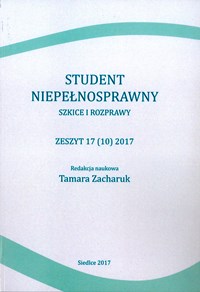The narrative identity of young adults with physical disability
Keywords:
the life span psychology, the narrative identity, the physical disability, the social factors, the cultural factorsAbstract
The aim of the thesis was to explore the different ways of constructing the narrative identity by young adults with physical disability and to look for social and cultural factors which could have impact on the variety of constructions of respondents’ narrations about the one’s own life. The author used the Life Story Interview written by Dan Mc Adams. The examined persons were 40 young adults with different kind and moment of gaining disability. There were persons with motor and the visual disability in the researched group. The disability of answerers was natural or was a cosequence of the impairment of the body during one’s own life. The studies’ outcomes indicate that according to responders’ point of view the main impact on the process of forming their narrative identity have three groups of factors:1) the experiences connected with the social relationships, 2) the cultural factors, especially mass- media, 3) the experiences connected with one’s own body and its impairment. There were also exceptional factors in each individual story which significantly influenced the form of the person’s narrative identity. The analysis of the thematic literature [among others Edwards 2007, Leszczyńska 2010, Dunn, Burcaw 2016] shows that the results of this research may broaden the knowledge about factors which can be helpful in forming the narrative identity of young adults with physical disability.
Downloads
References
the Social Function of Autobiographical Memory, Memory, 11.
Bąbka J., 2004, Tożsamościowa droga ku dorosłości osób niepełnosprawnych
ruchowo, [w:] Bąbka J. (red.). Człowiek niepełnosprawny w różnych
fazach życia, Wydawnictwo Akademickie „Żak”, Warszawa.
Collins K.M., Onwuegbuzie A.J., Jiao Q.G., 2007, A mixed methods
investigation of mixed methods sampling designs in social and health
science research, Journal of Mixed Methods Research, 1 (3).
Dunn D.S., Burcaw S., 2013, Disability identity: exploring narrative accounts of
disability, Rehabilitation Psychology, 58 (2).
Edwards S.D., 2007, Disablement and personal identity, Medicine, Health Care
and Philosophy, 10 (2).
Erikson E., 1980, Identity and the Life Circle. Zysk i S-ka, Poznań.
Galvin R., 2005, Researching the disabled identity: Contextualizing the identity
transformations which accompany the onset of impairment, Sociology
of Health and Illness, 27(3).
Gałdowa A., 2000, Wprowadzenie, [w:] Gałdowa A. (red.), Tożsamość
człowieka, Wydawnictwo Uniwersytetu Jagiellońskiego, Kraków.
Grzegorek T., 2000, Tożsamość a poczucie tożsamości. Próba uporządkowania
problematyki, w: Gałdowa A. (red.), Tożsamość człowieka, Wydawnictwo
Uniwersytetu Jagiellońskiego, Kraków.
Iskra J., 2002, Jakościowa analiza zdarzeń życiowych, [w:] Straś-Romanowska M.
(red.), Szkice psychologiczne, Wydawnictwo Uniwersytetu Wrocławskiego,
Wrocław.
Kowalik S., 2008, Psychologia rehabilitacji, Wydawnictwa Akademickie i Profesjonalne,
Warszawa.
Leszczyńska K., 2010, Tożsamość i stygmatyzacja w narracjach niepełnosprawnych
studentów, [w:] Gąciarz B. (red.), Niepełnosprawni studenci
w społeczności akademickiej. Źródła sukcesów i porażek w integracji
społecznej i aktywności zawodowej, Wydawnictwo Instytutu Filozofii
i Socjologii PAN, Warszawa.
McAdams D., 1985, Power, Intimacy and the Life Story: Personological
Inquiries into Identity, The Doresy Press, Homewood.
McAdams D., Adler J.M., Wagner J.W., 2007, Personality and the coherence of
the psychotherapy narratives, Journal of Research in Personality, 41.
Miles M.B., Huberman A.M., 2000, Analiza danych jakościowych (tłum.
S. Zabielski), Trans Humana, Białystok.
Opoczyńska M., 2002, Kim jestem? Doświadczenie choroby psychicznej
a stawanie się sobą, Wydawnictwo Uniwersytetu Jagiellońskiego,
Kraków.
Patton M.Q., 1990, Qualitative evaluation and research methods, Beverly Hills,
CA: Sage Publications, Inc.
Pasupathi M., 2001, The Social Construction of Personal Past and Its
Implications for Adult Development, Psychological Bulletin, 127.
Thorne A., McLean K., Lawrence A., 2004, When Remembering Is not Enough:
Reflecting on Self-Defining Events in Late Adolescsence, Journal of
Personalit, 72.
Reeve, D., 2002, Negotiating psycho-emotional dimensions of disability and
their influence on identity construction, Disability and Society, 17(5).
Ryżanowska D., 2014, Doświadczenie własnego ciała w kształtowaniu się
tożsamości młodych osób dorosłych z niepełnosprawnością fizyczną,
(niepublikowana praca doktorska), Uniwersytet Jagielloński, Kraków.
Stemplewska-Żakowicz K., Krejtz K. (red.), 2009, Wywiad psychologiczny. T. 1.
Wywiad jako postępowanie badawcze, Pracownia Testów Psychologicznych,
Warszawa.
Tokarska U., 1995, W poszukiwaniu jedności i celu. Wybrane techniki
narracyjne, [w:] Gałdowa A. (red.), Hermeneutyka a psychologia,
Wydawnictwo Uniwersytetu Jagiellońskiego, Kraków.
Twardowski A., 1991, Sytuacja rodzin dzieci niepełnosprawnych, [w:] Obuchowska
I. (red.), Dziecko niepełnosprawne w rodzinie, WSiP, Warszawa.
White M., Epston D., 1999, Narrative Means to Therapeutic Ends.
W.W. Norton and Co., New York-London.
Willig, C., Stainton-Rogers W., 2008, The sage handbook of qualitative
research in psychology, Sage Publications Ltd., London.
Żurko M., 2008, Wybrane metody analizy i interpretacji narracji
autobiograficznej w ujęciu hermeneutycznym, [w:] Janusz B.,
Gdowska K., de Barbaro B. (red.), Narracja. Teoria i praktyka, Wydawnictwo
Uniwersytetu Jagiellońskiego, Kraków.




